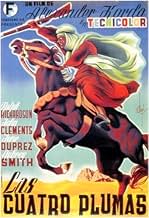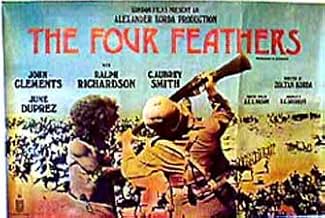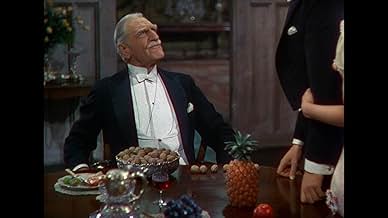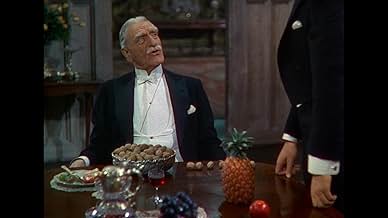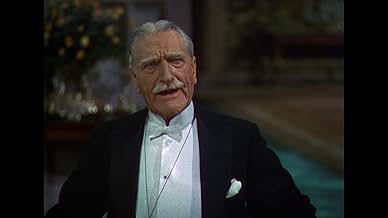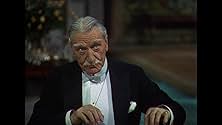AVALIAÇÃO DA IMDb
7,4/10
6,8 mil
SUA AVALIAÇÃO
Um tímido oficial do Exército Britânico de 1880 demite-se, queimando a sua convocação do último dia para a guerra no Sudão.Um tímido oficial do Exército Britânico de 1880 demite-se, queimando a sua convocação do último dia para a guerra no Sudão.Um tímido oficial do Exército Britânico de 1880 demite-se, queimando a sua convocação do último dia para a guerra no Sudão.
- Direção
- Roteiristas
- Artistas
- Prêmios
- 1 vitória e 2 indicações no total
Peter Cozens
- Man
- (não creditado)
Avaliações em destaque
It's ridiculous that movies like THE FULL MONTY and 28 DAYS LATER that have a British producer , director and screenwriter that were filmed entirely in Britain with an entirely British cast are not classed " British " simply because they were made by American studios . Somewhat ironic then that one of greatest British - And I mean truly British -films owes so much to the Korda brothers who came to this country from Hungary while the man responsible for the breath taking colour cinematography was from France
But I'm not going to be internationalist about THE FOUR FEATHERS because this is a movie that makes you proud to be British , something that is sadly no longer allowed to happen these days . Perhaps the most stirring thing I can say about this movie is the way it wipes the floor with the contemporary competition that was coming out of Hollywood at the time . While the American studio were making similar monochrome movies with Errol Flynn and David Niven as the leads Ralph Richardson's performance alone is a reason to watch this movie and even if it wasn't there's still the story itself featuring themes like courage , honour , romance and redemption . You want battle scenes ? There's several in this movie as well choreographed as any thing seen in cinema at this time but perhaps the most what sets this British movie apart from other movies that were being produced across the pond is that it's a bit more gritty and sadistic than what Hollywood was producing . In one scene a British officer is flogged like a dog and he screams in pain as the camera pans on to the Mufti's face , a face lit up in sadistic glee , then the scene cross fades into a crowded dungeon where the prisoners are kept , a dark hell hole where the audience can actually taste the pain , fear and misery from the unfortunate prisoners . Even in those days Hollywood would pull their punches while a film like THE FOUR FEATHERSwould not
Sadly THE FOUR FEATHERS was released in 1939 which meant it qualified for the legendary Oscar ceremony the following year when GONE WITH THE WIND swept the board . A great pity because this very British movie deserved a hat full of awards . Sadly too Britain no longer has a film industry of its own and is reliant upon American finance , but perhaps the saddest thing is even if we did have a film industry no one in the business would want to film such an exciting historical epic in case they were labeled reactionary or racist
But I'm not going to be internationalist about THE FOUR FEATHERS because this is a movie that makes you proud to be British , something that is sadly no longer allowed to happen these days . Perhaps the most stirring thing I can say about this movie is the way it wipes the floor with the contemporary competition that was coming out of Hollywood at the time . While the American studio were making similar monochrome movies with Errol Flynn and David Niven as the leads Ralph Richardson's performance alone is a reason to watch this movie and even if it wasn't there's still the story itself featuring themes like courage , honour , romance and redemption . You want battle scenes ? There's several in this movie as well choreographed as any thing seen in cinema at this time but perhaps the most what sets this British movie apart from other movies that were being produced across the pond is that it's a bit more gritty and sadistic than what Hollywood was producing . In one scene a British officer is flogged like a dog and he screams in pain as the camera pans on to the Mufti's face , a face lit up in sadistic glee , then the scene cross fades into a crowded dungeon where the prisoners are kept , a dark hell hole where the audience can actually taste the pain , fear and misery from the unfortunate prisoners . Even in those days Hollywood would pull their punches while a film like THE FOUR FEATHERSwould not
Sadly THE FOUR FEATHERS was released in 1939 which meant it qualified for the legendary Oscar ceremony the following year when GONE WITH THE WIND swept the board . A great pity because this very British movie deserved a hat full of awards . Sadly too Britain no longer has a film industry of its own and is reliant upon American finance , but perhaps the saddest thing is even if we did have a film industry no one in the business would want to film such an exciting historical epic in case they were labeled reactionary or racist
10srschulz
I cannot recall when I first saw this movie, certainly more than 30 years ago, but it is one that I've never forgotten and watch again whenever I can. Of the actors, only Ralph Richardson and C. Aubrey Smith are familiar. However, the ensemble play of the lesser known actors is certainly outstanding. I can still remember the determination of young Faversham desperately trying to regain his honor and his girl. After all these years I don't remember the finer details, but the film as a whole, as well as the book on which it is based are classics, and I'm certain Miklos Rozsa's lush strains added much to the overall effect. It's a film well worth seeing for those who enjoy derring-do and historical drama. I've never seen any of the other versions to see if I enjoyed them even half as much.
No, this isn't how we regard military service or Empire anymore, and I hope it's not how we regard other peoples and races, but there are things about this picture that still getcha.
The film celebrates friendship and mutual obligation. It celebrates courage and determination. It celebrates a beautiful young couple and the love that conquers all, and celebrates the fact that the movies never let the funny-looking guy get the girl. It celebrates C. Aubrey Smith's eyebrows, and that's reason enough to watch any film.
The real heroes are Ralph Richardson, for acting at least 100% in every scene, never coasting or losing concentration for a minute, and the euphoniously named Osmond Borrodaile, whose second unit cinematography in faraway locations with monstrous cameras under difficult conditions enlivened many a movie.
The film celebrates friendship and mutual obligation. It celebrates courage and determination. It celebrates a beautiful young couple and the love that conquers all, and celebrates the fact that the movies never let the funny-looking guy get the girl. It celebrates C. Aubrey Smith's eyebrows, and that's reason enough to watch any film.
The real heroes are Ralph Richardson, for acting at least 100% in every scene, never coasting or losing concentration for a minute, and the euphoniously named Osmond Borrodaile, whose second unit cinematography in faraway locations with monstrous cameras under difficult conditions enlivened many a movie.
One of my all-time favourite films of the 30s, perhaps even ever. For me, this is my personal favourite of all the Korda brothers films, and it is a true gem of a film that shouldn't be missed.
There is very little to fault The Four Feathers. It has truly evocative location work, sweeping cinematography and rich bold colours that still look amazing. The script is tight, the story is epic and always compelling and the film is perfectly paced with some great action. Miklos Rosza's score is just outstanding, easily up there as one of his best, while Zoltan Korda directs beautifully, and the acting of John Clements, Ralph Richardson and C.Aubrey Smith is excellent.
Overall, this film is a must see for so many reasons especially for its wonderful visuals and score. 10/10 Bethany Cox
There is very little to fault The Four Feathers. It has truly evocative location work, sweeping cinematography and rich bold colours that still look amazing. The script is tight, the story is epic and always compelling and the film is perfectly paced with some great action. Miklos Rosza's score is just outstanding, easily up there as one of his best, while Zoltan Korda directs beautifully, and the acting of John Clements, Ralph Richardson and C.Aubrey Smith is excellent.
Overall, this film is a must see for so many reasons especially for its wonderful visuals and score. 10/10 Bethany Cox
The 1939 version of Four Feathers deserves to be better known. It's one of those action classics like The Scarlet Pimpernel or Mutiny on the Bounty whose conflicts are as relevant to one era as another. In this case they revolve around different forms of courage and honor. A man from a prominent military family is snubbed as a coward by his fellow officers and even his fiancée when he refuses to participate in Britain's Sudanese campaign of the 1890s which he believes is imperial folly. He gradually regrets his decision and decides to make amends by secretly traveling to the Sudan to help his regiment as a spy behind enemy lines. To get away with this ruse he takes drastic steps to disguise himself as a local tribesman.
The Technicolor photography is eye-poppingly rich, at the same level as three other 1939 color classics—namely, Gone with the Wind, The Wizard of Oz and Drums Along the Mohawk. Particularly effective are the transitions from the browns and yellows of North African military outposts, with their punctuations by the red, white and blue of the Union Jack, to the deep greens of rural England. To top it off, much of the film was actually shot in the Sudan with what seems like thousands of native extras. By looks alone, sometimes it's hard to believe that this production predates the Second World War. It might have been a huge hit if it had had a Cary Grant or a Clark Cable or an Errol Flynn in the lead. As things go, John Clements is as good as can be, if not exactly bursting with charisma. Ralph Richardson gives a bravura performance as Clement's fellow officer, though he is saddled with a sequence that strains credulity beyond the breaking point. Let's just say that it takes a physically fit man longer than 30 seconds of direct exposure to the desert sun before he suffers total disorientation and unconsciousness. And if the sun can do that much damage so swiftly, then surely the flesh of the unconscious man's face, exposed for hours, would be cooked to a cinder.
C. Aubrey Smith plays his usual crusty old Brit, this time as a bombastic Crimean War veteran who complains that men are no longer men and war is no longer war. His repetitious boasting wears thin after a while. June Duprez barely registers as the female love interest.
The Technicolor photography is eye-poppingly rich, at the same level as three other 1939 color classics—namely, Gone with the Wind, The Wizard of Oz and Drums Along the Mohawk. Particularly effective are the transitions from the browns and yellows of North African military outposts, with their punctuations by the red, white and blue of the Union Jack, to the deep greens of rural England. To top it off, much of the film was actually shot in the Sudan with what seems like thousands of native extras. By looks alone, sometimes it's hard to believe that this production predates the Second World War. It might have been a huge hit if it had had a Cary Grant or a Clark Cable or an Errol Flynn in the lead. As things go, John Clements is as good as can be, if not exactly bursting with charisma. Ralph Richardson gives a bravura performance as Clement's fellow officer, though he is saddled with a sequence that strains credulity beyond the breaking point. Let's just say that it takes a physically fit man longer than 30 seconds of direct exposure to the desert sun before he suffers total disorientation and unconsciousness. And if the sun can do that much damage so swiftly, then surely the flesh of the unconscious man's face, exposed for hours, would be cooked to a cinder.
C. Aubrey Smith plays his usual crusty old Brit, this time as a bombastic Crimean War veteran who complains that men are no longer men and war is no longer war. His repetitious boasting wears thin after a while. June Duprez barely registers as the female love interest.
Você sabia?
- CuriosidadesDirector Zoltan Korda's own remake of this film, Tormenta Sobre o Nilo (1955), re-used a lot of the battle sequences from this movie, which did not lend themselves very well to the cropping necessary to achieve the width of the CinemaScope ratio, nor did their comparative fuzziness blend well with the new footage.
- Erros de gravaçãoWhen Capt. Durrance feels the face and head of the dead soldier outside his tent, the corpse moves his head, lifting and turning it.
- Citações
Harry Faversham: In England, the white feather is the mark of a coward.
Dr. Harraz: Ah, I see. Then why worry? Be a coward and be happy.
Harry Faversham: No, Doctor. I have been a coward, and I wasn't happy.
- Cenas durante ou pós-créditosOpening credits prologue: In 1885 the rebellious army of cruel dervishes enslaved and killed many thousands of defenceless natives in the Sudan, then laid siege to Khartoum. The scanty garrison's heroic commander, General Gordon appealed for help from England - but no help reached him.
- ConexõesEdited into Tormenta Sobre o Nilo (1955)
- Trilhas sonorasAuld Lang Syne
(1788) (uncredited)
Lyrics by Robert Burns, music traditional
Heard during the departure of the Regiment
Principais escolhas
Faça login para avaliar e ver a lista de recomendações personalizadas
Detalhes
- Tempo de duração2 horas 9 minutos
- Proporção
- 1.37 : 1
Contribua para esta página
Sugerir uma alteração ou adicionar conteúdo ausente

Principal brecha
What is the French language plot outline for As Quatro Penas Brancas (1939)?
Responda

